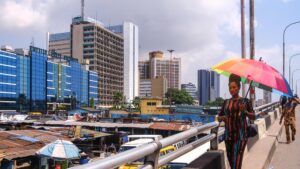The Central Bank of Nigeria Raises Interest Rates Amid Currency Crisis
In a move to address the historic currency crisis and soaring inflation in Africa’s largest economy, the Central Bank of Nigeria (CBN) announced a 200 basis point hike in its key interest rate on Tuesday. The CBN’s main monetary policy rate will now stand at 24.75%, up from 22.75%, marking the second consecutive increase after February’s 400 basis point raise.
Governor Olayemi Cardoso explained at a press conference that policymakers believe continued tightening is necessary to curb runaway inflation. This latest hike, though smaller than the previous one, is seen as evidence of the CBN’s aggressive efforts to tackle inflation and restore market confidence, according to David Omojomolo, an Africa economist at Capital Economics.
Despite concerns about the impact on economic growth, officials are prioritizing the fight against inflation, which reached 31.7% year on year in February and is expected to rise further in the coming months. The CBN’s February meeting minutes revealed a consensus among policymakers for aggressive interest rate hikes to address the high inflation rates, the highest recorded since April 1996.
Looking ahead, Capital Economics anticipates further tightening measures under Governor Cardoso’s leadership to stabilize inflation and resolve the currency crisis. The expectation is for additional 100 basis point hikes at the upcoming meetings in May and July before potentially halting the hiking cycle for the remainder of the year.
Nigeria’s currency, the naira, has experienced a sharp depreciation of around 70% against the U.S. dollar over the past year, hitting an all-time low of 1,600 naira to the dollar in late February. However, the naira has since shown signs of recovery, trading around 1,400 naira as of Tuesday morning following the clearing of a $7 billion backlog of imports.
While the MPC’s decision to hike rates in February was met with differing viewpoints on the drivers of inflation and naira weakness, Governor Cardoso’s leadership and the need to restore market confidence were central to the decision. Doves in the committee warned about the risks of aggressive rate hikes and the structural nature of inflation, while hawks emphasized the importance of boosting the naira through positive real interest rates and attracting foreign investment.
Overall, the CBN’s recent interest rate hike reflects ongoing efforts to stabilize the Nigerian economy, address inflation, and strengthen the country’s currency amidst challenging economic conditions.
Source link


